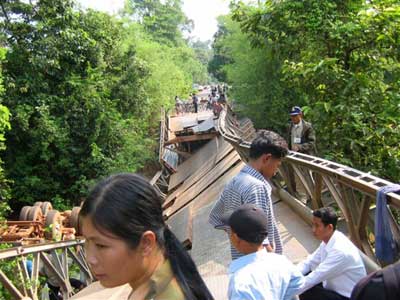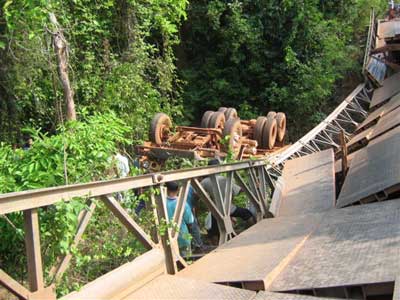


| LES 6 COMMANDEMENTS |
COURRI@L 2004 | THE 6 COMMANDMENTS |
 |
 |
 |
[Ann / The
Nation] : The signing ceremony for the ambitious transport linkage
co-operation between Asian countries will take place in Shanghai later
this month. It will be part of the 16th session of the United Nations Economic
and Social Commission for Asia and the Pacific (Unescap)
from April 22-28. The Intergovernmental Agreement on the Asian
Highway Network was adopted in November last year. It has identified
roads to be developed as international highways linked to road networks
throughout the region. The highways, totalling 140,000 kilometres, will
connect 32 countries. The Trans-Asian Railway
network will connect Asia to Europe and facilitate intraregional and interregional
movements. The network will comprise 80,000km
of track in 25 countries. Dr Raj Kumar, chief of Unescap's Poverty
and Development Division, said both systems would provide links to ports
for landlocked countries such Nepal, Bhutan, Laos and Mongolia. They will
also link Asean and Saarc countries. Saarc
is a regional economic co-operation between South Asian countries, Bangladesh,
Bhutan, India, Maldives, Nepal, Pakistan and Sri Lanka.
Kumar said greater regional co-operation
was needed in the face of globalization if developing nations in Asia were
to keep pace with wealthier countries. He said the region would benefit
from enhanced government-to-government co-operation and private-sector
initiatives such as the relocation of factories within the region, as Japan
had done with Thailand. The Asian Highway
and Trans-Asian Railway is, he says,
one way of furthering regional development. "We [Unescap] see the importance
of constructing transport linkage within the region in order to distribute
development through all countries, not only to the developed ones,"
he said. Kumar said Unescap had also urged Asian countries to look to the
European Union as a model for regional co-operation. Better regional co-operation
will, he said, solve the "spaghetti-bowl" impact of complex bilateral free-trade
agreements, the result of the failed World Trade Organisation multilateral
trade talks last year. The theme of the session in Shanghai is "Meeting
the challenges in an era of globalization by strengthening regional development
cooperation".
N.P. : This pact will be profitable for each signatory country only if the concerned roads / railways to be built / upgraded in each State are realized by companies and people in that State. Are Cambodian engineers and technicians graduated from l'Institut de Technologie du Cambodge able and ready to take the challenge? Can experienced engineers and technicians of the Cambodian diaspora associate with those inside Cambodia and set up private consulting firms and construction enterprises? Do honest commercial laws exist in Cambodia? Will politicians and civil servants let technical projects make their way rationally?
|
APRIL 20th, 2004
[Kohsantepheap] |
 |
 |
 |
| LES SIX COMMANDEMENTS |
REFORMING OUR BUDDHISM |
ROMAN POLITIQUE |
DIEU vs BOUDDHA |
GRAMMAR Introduction |
COURRI@L 2004 (Previous) |